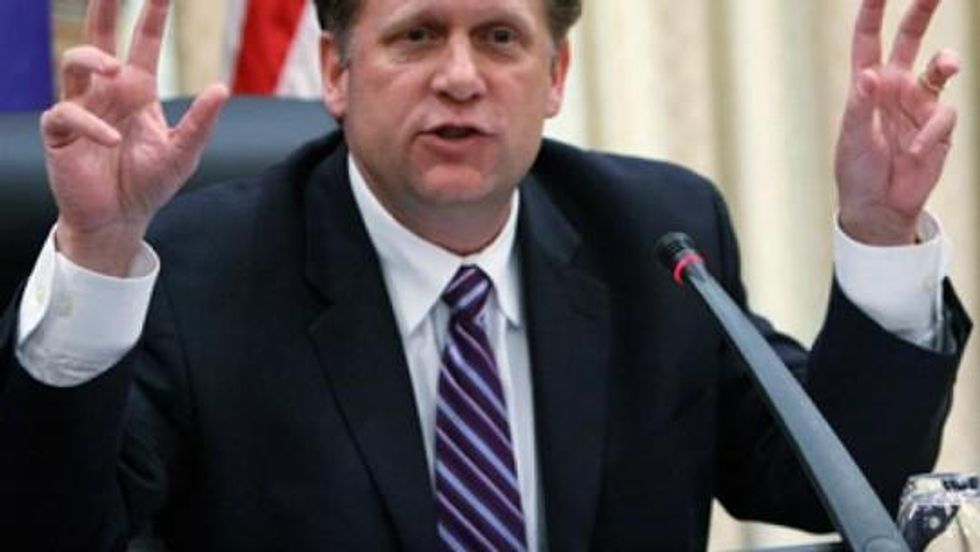In recent days the New York Times published two op-ed pieces on Ukraine and Russia by officials affiliated with the National Endowment for Democracy (NED) without mentioning their NED affiliations.
On March 23, the Times printed a lengthy op-ed piece by Michael A. McFaul titled, "Confronting Putin's Russia." The Times identified McFaul in full as follows: "Michael A. McFaul, a Hoover fellow at Stanford, served for five years in the Obama administration, as a special assistant to the president at the National Security Council and as ambassador to the Russian Federation." The Times did not mention that McFaul is a Research Council Member of an academic wing of the National Endowment for Democracy. As the United States ambassador to Russia from January 2012 to February 2014, McFaul was the highest ranking member of the State Department in Russia. He thus presumably would have had knowledge of the details of the NED's $8 million budget for Russiain each year of his two-year tenure there, given that the NED "receives an annual appropriation from the U.S. Congress through the Department of State."
Two days later, on March 25, the Times published an op-ed piece by Zalmay Khalilzad titled, "Stand Up To Russia Now." The Times identified Khalilzad in full as follows: "Zalmay Khalilzad was the United States ambassador to the United Nations from 2007 to 2009." The Times did not mention that Khalilzad is on the Board of Directors of the National Endowment for Democracy.
In his op-ed piece for the Times, McFaul wrote: "In addition to more autocracy, Mr. Putin needed an enemy - the United States - to strengthen his legitimacy. His propagandists rolled out clips on American imperialism, immoral practices and alleged plans to overthrow the Putin government. As the ambassador in Moscow, I was often featured in the leading role in these works of fiction." McFaul likewise referred to Russian "autocracy" on three other occasions in his op-ed piece. Fair enough. However, probably because I am an American, I have been considerably less concerned in recent years with the autocracy in Russia than with the plutocracy here. Basically, I'll start worrying about Russian autocracy when President Obama and our corporate-controlled Congress roll back our own national security state, for which U.S. citizens are billed $1 trillion a year while our cities, public schools, and infrastructure starve.
Nor is McFaul's denial of U.S. involvement in Russia's internal affairs convincing, although I wish it were. A more persuasive denial on his part would have featured a line-item elucidation of the NED's $8 million a year in Russia. For example, why did the NED allocate $719,535 in 2013 for a project called "Transparency in Russia," the mission of which is "to raise awareness of corruption" in Russia? And why did the NED allocate $550,000 for "Increasing Political Competition in Russia"? Why are things like "transparency" and "corruption" and "political competition" in Russia the business of the United States government? Sounds fishy. And ironic, given the Obama administration's hallmark lack of transparency and the evisceration of political competition in my own political party, given the early coronation of Hillary Clinton as the Democratic nominee for president in 2016.
In his Times op-ed, McFaul also wrote: "The shrill anti-Americanism uttered by Russian leaders and echoed on state-controlled television has reached a fanatical pitch with Mr. Putin's annexation of Crimea. He has made clear that he embraces confrontation with the West, no longer feels constrained by international laws and norms, and is unafraid to wield Russian power to revise the international order." Has McFaul not watched TV and read the newspapers of his own country? Is he unaware of the serial violations of international law by presidents Bush and Obama? Did he not observe the U.S-supported coup last month in Ukraine, which triggered the Russian annexation of Crimea?
Likewise, Zalmay Khalilzad wrote in "Stand Up to Russia Now" that "the United States should impose further sanctions against Russian officials, increase support to regional allies (including the restoration of American missile defense commitments and the movement of NATO forces into Eastern Europe), provide military assistance to the Ukrainian government, and arm forces willing to resist a Russian occupation of Eastern Ukraine." This is Khalilzad's recommended response to the referendum in Crimea favoring Russian annexation, which followed the violent U.S.-backed coup in Ukraine and, before that, the political, economic, and military integration of the former Warsaw Pact countries into the European Union and NATO. There's a psychopathic element involved in the extreme criminalization of the lesser offenses of others coupled with the exaltation of the greater crimes of ourselves, a condition endemic among foreign-policy elites in the United States.

